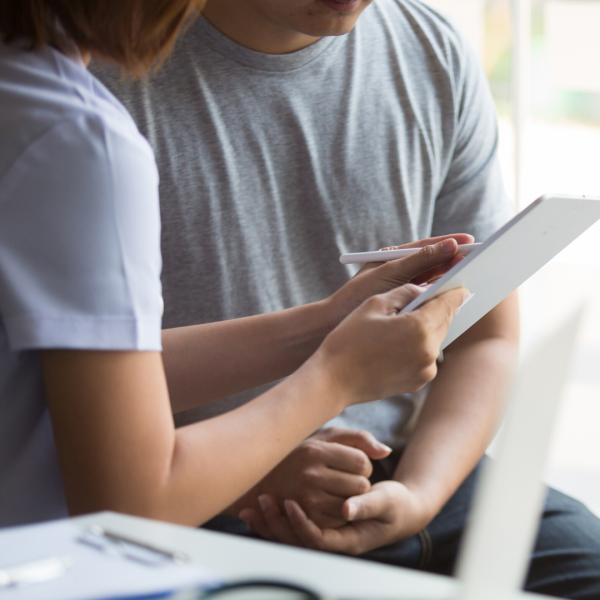Returning to work after cancer treatment

When you have finished cancer treatment, you may expect to go back to your old way of life and return to work straight away. But everyone reacts differently and some people can feel tired for a year or more after their treatment ends. Your return to work may not happen in the way you expect.
Deciding if you’re ready to go back to work
Deciding to go back to work can depend on many different things. For example, your financial situation, the type of work that you do and how well you feel after treatment.
Many people are keen to get back to work as soon as possible because it means they are getting back to ‘normal’ and that they are over their cancer, but it’s important to be realistic about what you can and cannot do and not to rush back to work if you don’t feel ready.
Cancer can also have a powerful emotional effect. If you have strong emotions, you might need to take a few months after your treatment has finished to adjust to what has happened.

Talk to your doctor
If you think you would like to go back to work, speak to your doctor about whether it’s safe for you to return to work. It can depend on the type of cancer you have, the type of treatment you have had and if you still have side-effects from treatment. It may also depend on the type of job you do. For example, you may need more time to recover before returning to a physical or very demanding or stressful job.
Your employer may ask for a letter from your doctor or ask you attend a doctor recommended by them to check that you are ok to return to the job you were doing.
If your doctor doesn’t think you’re well enough to work, they will give you a certificate so that you can apply for social welfare benefits.
Planning your return to work
If you can, plan to return to work gradually. Talk to your employer, human resource manager or occupational health department. They may have a return-to-work policy that guides the employer and you how to best return to work.
It is best to try to clarify as much as possible with your employer before you return to work so that it goes as smoothly as possible. For example:
- Let them know that you may need some time off. Try to let your employer know in advance if you have hospital appointments
- If you feel you cannot return to the job that you were doing, you need to discuss this
- You may want to chat about flexible work arrangements. Examples of this would be returning on a phased basis, starting 1 or 2 days per week or working half days and building up slowly. Depending on your job, you might have the option of working from home
- It’s also best to ensure that you are aware how much you will be paid if you are returning on a phased basis. You may be paid less than you expect and may need to contact your welfare office to discuss a payment to help until you return to work fully. If you cannot continue working or are self-employed, it may be useful to talk to the Department of Social Protection. You may be entitled to claim certain benefits. You will need a doctor’s certificate saying you’re not well enough to work in order to claim social welfare benefits
Most employers will help you to start back to work part-time and build up to full-time hours.
Advice about benefits and entitlements
- Contact the Department of Employment Affairs and Social Protection Information Section Tel: 1890 500 000 / Website: www.welfare.ie
- Ask our cancer nurses – call our Support Line on Freephone 1800 200 700 or visit a Daffodil Centre.
- Call Citizens Information on 0761 07 4000 or call into your local centre. A list of centres is available at centres.citizensinformation.ie
Possible challenges you may face if you go back to work
You may need to adjust your way of working if you still have side-effects that are bothering you. For example, fatigue, memory or concentration difficulties, urinary or bowel problems. We have more on coping with different side-effects.
Tips for managing side-effects at work
- Talk to your employer or supervisor regularly to update them on how you are getting on and if you feel any adjustments need to be made. For example, if you’re fatigued you may need to work different hours when your energy is better, or take breaks during the day; if your toilet habit has changed, you might need more or longer breaks; if you have peripheral neuropathy (nerve damage in your hands or feet), it may not be safe for you to do certain jobs.
- Give yourself time to settle back in and don’t expect to be 100% well immediately. Remember that most side-effects improve in the weeks and months after treatment has ended
- Talk to your occupational health adviser if you have one. They have a duty to support you doing your job and help you with any health problems that may affect your work
- If you have a physical or mental health difficulty / disability on return to work, you are legally entitled to ‘reasonable accommodations’ in the workplace. Talk to your employer / occupational health department about any specific concerns you have.
Fatigue (tiredness)
Fatigue is a very common side-effect of cancer treatment and it can carry on for months for some people.
Some people find that tiredness is mild and does not interfere with their work. Others find it has a greater impact. For example, you may find it hard to concentrate or make decisions. This can affect the quality of your work. We have more information on fatigue.
Tips for managing fatigue at work
- Talk to your employer about how you can plan and prioritise your work for when you feel less tired
- Identify aspects of your work that may be too tiring and ask your employer if these can be put on hold or given to another colleague. If necessary, ask about a short-term change of duties
- Where possible, extend deadlines and ask colleagues to help you with some of your work
- Keep regular notes to remind you of what work you need to get done that day
- Keep a diary of your energy levels throughout the day. You may notice that there are times when you are more productive without too much effort
- Discuss the possibility of flexible working hours, reduced working hours or working from home. Let colleagues know how you will manage your work, how to contact you and when you will check in with them
- Plan short breaks every now and then so you can rest
You and your colleagues
It’s entirely your decision how and if you talk about your cancer with colleagues. It can be a very sensitive matter, so ensure you are strong enough to do it if you decide to confide in someone. You may decide to tell only 1 or 2 colleagues or you may talk openly about it.
It might be a good idea to talk to your employer about your preferences about disclosing your illness so that they can support you.
If confiding in colleagues, you might like to pick individuals you are close to and know how they may react. Keep it simple: there is no need to go into details of treatment.
Allowing your colleagues to understand what you have been through will give them a better understanding of your possible limitations, and an element of patience when you’re doing certain tasks.
You may find that your colleagues will have different reactions to you when you go back to work. Some people may have no idea what to say and may act like nothing has happened to you. Others may be afraid of hurting you so they will avoid saying anything at all. Some colleagues may not understand what you have been through – for example, if they have no experience of cancer among their friends and family, they may not be so understanding. Try not to take this personally.
You may not want to discuss your future work plans with your employer and colleagues when you first return to work. Although you may feel ready at the beginning, sometimes people realise that the job they used to do is no longer achievable or enjoyable.
If you’re feeling anxious about meeting your colleagues, it might help to meet them for a coffee or a casual catch-up before you return to work. For example, if your physical appearance has changed due to your treatment you might find it easier to meet in a casual setting before you start work.
For more information
Phone
1800 200 700



